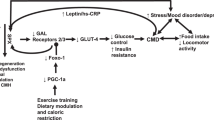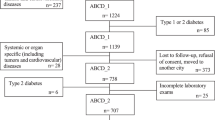Abstract
The leucine7 to proline7 (Leu7Pro) polymorphism in preproneuropeptide Y (preproNPY) has been associated with accelerated atherosclerosis and type II diabetes, both of which are obesity-related diseases. The current study evaluated the impact of obesity on the disease risk linked to the Leu7Pro polymorphism of preproNPY in 393 elderly subjects. In 6 years follow-up, the polymorphism alone did not change the risk for abnormal glucose regulation, while obesity was associated with a significant 3-fold risk (odds ratio (OR) 2.95; 95% confidence interval (CI) 1.81–4.81, P<0.001) and the Leu7Pro polymorphism–obesity interaction, with a remarkable 12-fold risk (OR 12.33; 95% CI 1.18–128.35, P<0.05). The Leu7Pro polymorphism modified significantly the 10-year incidence of cardiovascular events, causing a 7.6-fold increase in the hazard ratio (HR 7.58; 95% CI 2.87–20.03, P<0.001) in the obese but not in the nonobese subjects. The results indicate that obesity may be a pivotal factor in multiplying the disease risk associated with the Leu7Pro polymorphism in preproNPY.
This is a preview of subscription content, access via your institution
Access options
Subscribe to this journal
Receive 12 print issues and online access
$259.00 per year
only $21.58 per issue
Buy this article
- Purchase on Springer Link
- Instant access to full article PDF
Prices may be subject to local taxes which are calculated during checkout

Similar content being viewed by others
Accession codes
References
Buckland PR, Hoogendoorn B, Guy CA, Coleman SL, Smith SK, Buxbaum JD et al. (2004). A high proportion of polymorphisms in the promoters of brain expressed genes influences transcriptional activity. Biochim Biophys Acta 1690, 238–249.
Ding B (2003). Distribution of the NPY 1128C allele frequency in different populations. J Neural Transm 110, 1199–1204.
Jaakkola U, Kuusela T, Jartti T, Pesonen U, Koulu M, Vahlberg T et al. (2005). The Leu7Pro polymorphism of preproNPY is associated with decreased insulin secretion, delayed ghrelin suppression and increased cardiovascular responsiveness to norepinephrine during oral glucose-tolerance test. J Clin Endocrinol Metab 90, 3646–3652.
Kallio J, Pesonen U, Jaakkola U, Karvonen MK, Helenius H, Koulu M (2003). Changes in diurnal sympathoadrenal balance and pituitary hormone secretion in subjects with Leu7Pro polymorphism in the prepro-neuropeptide Y. J Clin Endocrinol Metab 88, 3278–3283.
Karvonen MK, Valkonen VP, Lakka TA, Salonen R, Koulu M, Pesonen U et al. (2001). Leucine7 to proline7 polymorphism in the preproneuropeptide Y is associated with the progression of carotid atherosclerosis, blood pressure and serum lipids in Finnish men. Atherosclerosis 159, 145–151.
Karvonen MK, Pesonen U, Koulu M, Niskanen L, Laakso M, Rissanen A et al. (1998). Association of a leucine(7)-to-proline(7) polymorphism in the signal peptide of neuropeptide Y with high serum cholesterol and LDL cholesterol levels. Nat Med 4, 1434–1437.
Mooy JM, Grootenhuis PA, de Vries H, Valkenburg HA, Bouter LM, Kostense PJ et al. (1995). Prevalence and determinants of glucose intolerance in a Dutch caucasian population. The Hoorn Study. Diabetes Care 18, 1270–1273.
Nordman S, Ding B, Ostenson CG, Karvestedt L, Brismar K, Efendic S et al. (2005). Leu7Pro polymorphism in the neuropeptide Y (NPY) gene is associated with impaired glucose tolerance and type 2 diabetes in swedish men. Exp Clin Endocrinol Diabetes 113, 282–287.
Poirier P, Giles TD, Bray GA, Hong Y, Stern JS, Pi-Sunyer FX et al. (2006). Obesity and cardiovascular disease: pathophysiology, evaluation, and effect of weight loss. Arterioscler Thromb Vasc Biol 26, 968–976.
Ukkola O, Kesaniemi YA (2007). Leu7Pro polymorphism of PreproNPY associated with an increased risk for type II diabetes in middle-aged subjects. Eur J Clin Nutr 156, 263–269.
Acknowledgements
This study was financially supported by the Academy of Finland, EVO grants of Turku City Hospital and Turku University Hospital, the Finnish Diabetes Research Society, the Finnish Medical Society Duodecim, the Finnish Cultural Foundation and the Turku Graduate School of Clinical Sciences.
Author information
Authors and Affiliations
Corresponding author
Rights and permissions
About this article
Cite this article
Jaakkola, U., Kallio, J., Heine, R. et al. Neuropeptide Y polymorphism significantly magnifies diabetes and cardiovascular disease risk in obesity: the Hoorn Study. Eur J Clin Nutr 63, 150–152 (2009). https://doi.org/10.1038/sj.ejcn.1602964
Received:
Revised:
Accepted:
Published:
Issue Date:
DOI: https://doi.org/10.1038/sj.ejcn.1602964



